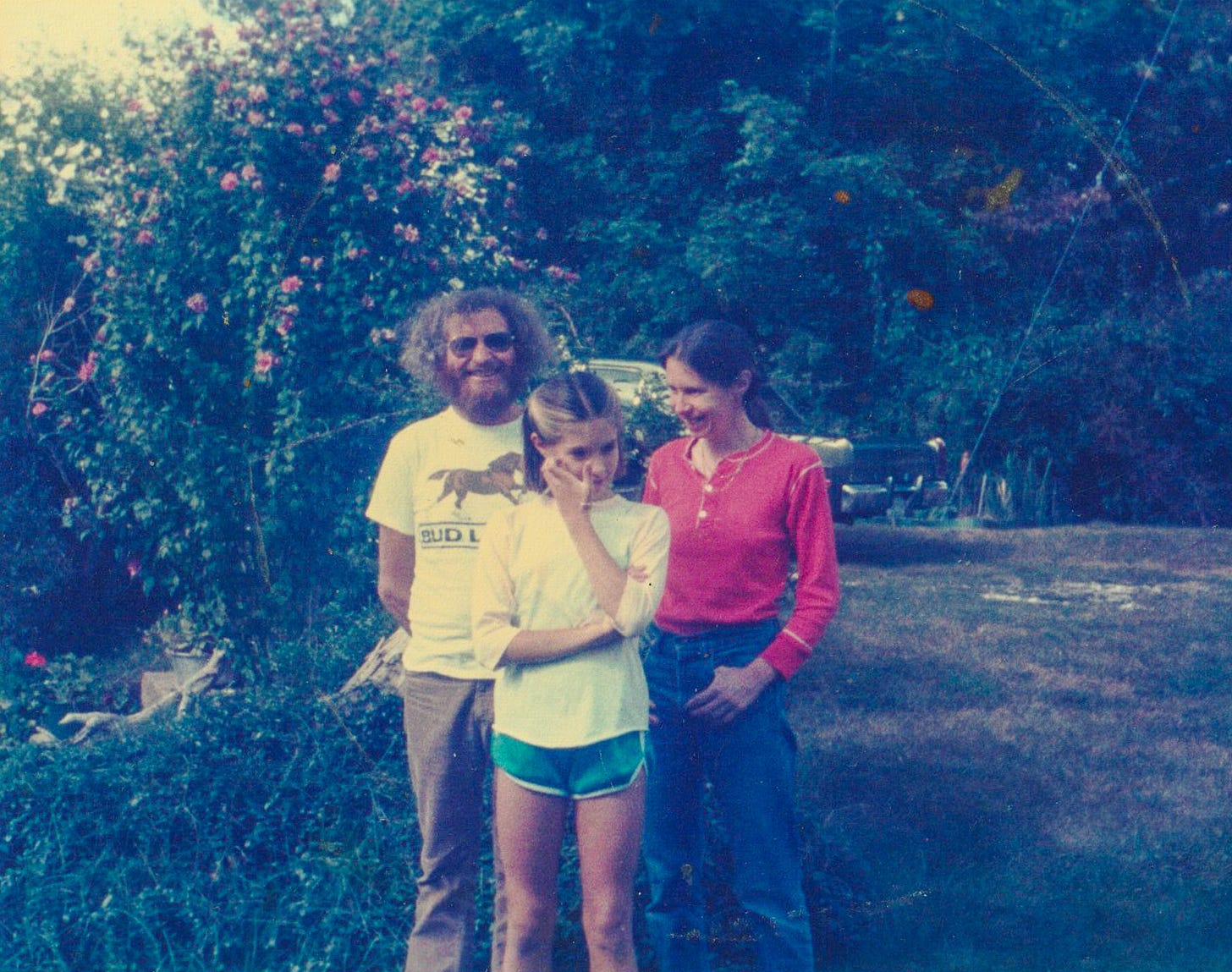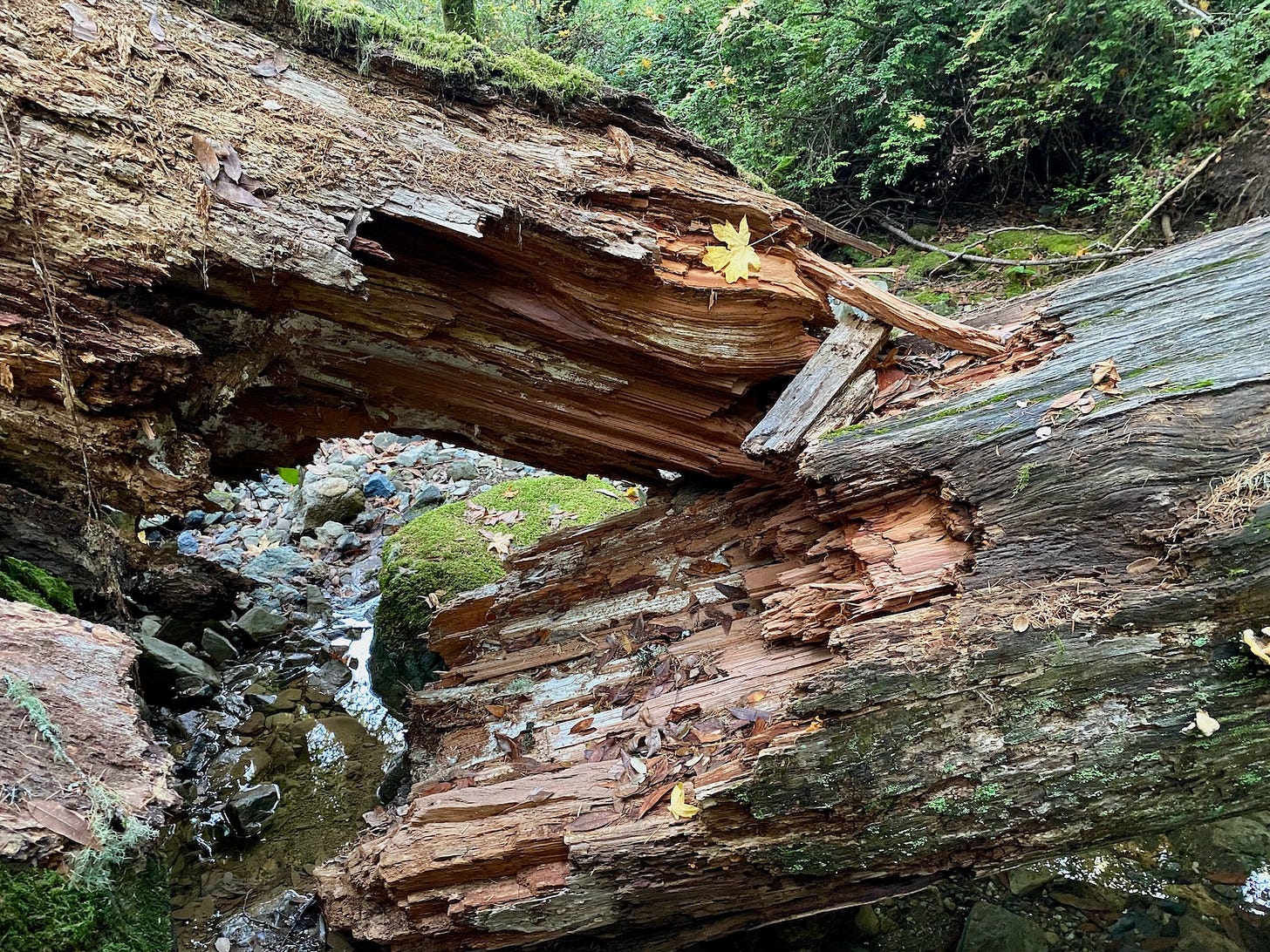Hello friends,
Each day the news presents us with images of people living through unthinkable disasters. Their future lives will be shaped by those disasters, with a distinct sense of “before” and “after.” While problems of illness, accidents, and divorce seem to pale in comparison, personal tragedies can form a similar demarcation line in the lives of those who experience them.
This car wreck on the Coastal Trail was featured in a grid of 12 photos (one taken each month of the year) in the Flags in Mind exhibition.
Internet research uncovered a KQED story from 2015 in which a team investigated the site. They determined that the car was a 1941 Pontiac and that it crashed before 1970, the year the trail was built. A local historian said if the incident had entailed human injury or death, he would have been able to locate a newspaper article or other record. One person theorized that a group of beer-guzzling teens pushed the car over the edge in the 1950s.
I first noticed the tag “Not falling 4 it” on the wreck in November 2020 when the United States was reeling from false claims about the presidential election results by the losing incumbent.
No longer falling for it can be the beginning of the “After” times
A few weeks ago, I wrote about my stepfather Papa’s drug bust in 1985 and how it brought me to California for the first time. The after-effects on my life were immense, and the growth of self-awareness and personal agency instigates a narrative shift from present to past tense in my memoir Escape from Nowhere. No longer was I a girl at the mercy of her parents’ whims; I developed plans of my own—and believed in them.
An excerpt from the chapter “Salesmanship:”
Selling was a way of life for Papa. It didn’t matter what he sold: gems, birdhouses, Austrian crystals, ziplock bags, gold chains, pot, cocaine, a countercultural family dream.
After the drug bust, I was no longer a customer.
The three years after the bust saw the unraveling of a marriage that ended with an act of betrayal. Even before the drug case was dropped, my stepfather Papa built a root cellar, claiming it would store my mother’s garden bounty. My mother Cheryl was too busy working between the Switftwater General Store and the Lisbon video rental shop to make pickles, and he installed a hydroponic growing system. The catalog showed the device growing tomatoes, but he planted marijuana seeds in it. (Marijuana is still illegal in New Hampshire, though possession of small amounts has been decriminalized.) Cheryl wanted it out of the house, and they fought about it.
From the chapter “Fishbowl:”
“It’s my house and you can’t tell me what I can and can’t do,” Papa said.
“It’s our house and there is a child living here,” Cheryl said. “Lee Ann is going to go to college and she won’t be able to get federal scholarships if you get arrested for pot in the house.” I wasn’t sure if this was true, but it sounded plausible.
“Lee Ann does not need to go to college. Look at me, I only went as far as eighth grade, and I’m doing just fine!”
I was in 10th grade by then and I was not falling for it. He moved the hydroponic contraption to a friend’s barn and planned a California gold mining expedition, but my mother insisted we stay in New Hampshire so that I could finish high school. By my senior year, the fault lines were so wide that an earthquake was imminent.
From the chapter “Fault Lines:” (Scotty is Papa’s name; he and my mother met when I was five)
Twelve years before, Scotty and Cheryl bonded over the dream of travel. She wanted to get out of New Hampshire, and he created a life for us that fulfilled that goal. Without the ability to take us places, his power was diminished. And by supporting me in my many endeavors, Cheryl had made it clear whose desires were more important: mine.
There was nowhere left for any of us to go but apart.
No matter how old you are when your parents divorce, it shapes the rest of your life. Holidays and family visits become a balancing act between parents’ locations and interests. Discernment grows as you learn how much to share about one parent’s activities with the other. Being the “monkey in the middle” has few advantages other than personal growth through forgiveness and (hopefully) witnessing them happier than before. Papa moved to Cape Cod and I spent five summers there, though I didn’t live with him.
In the prologue of Escape from Nowhere, I visit Papa during his first week in hospice care. He was 88 years old. From “The End at the Beginning:”
Yesterday, when we were alone, he looked at me seriously and said, “I want you to know that I never did or said anything to prevent your education.”
Looking him straight in eyes, I absorbed the lie as a dying man’s wish that he could be absolved of his hurtful actions, that he could take credit for my academic and professional success, and that he could own his pride in me and my accomplishments. I let him have that gift—because today I am going to give him absolution in a way he is not expecting. I must read him the end of this book.
When love is the only option
We don’t have to rely on clergy members, judges, or government entities to offer absolution—the ultimate act of forgiveness. One way to counter the hate everywhere in the world is to become bigger vessels for love, even if only in our personal lives.
Appearing at someone’s deathbed with a grudge is no more appropriate than blaming a baby for crying too much. Whatever wreckage they caused made us into who we are, no matter how hard it was—and perhaps still is—to live through.
Writing about these events is an act of self-love. Art-making is one of the few ways I know how to reckon with the wreckage. The site of the first flag photo now looks very different.
We get what we’re meant to have
Papa took me on many hikes and taught me how to read the land while Cheryl taught me how to sew. The combination of everything I experienced in those years gave me a creative outlet that’s still evolving along with the forest.
I take comfort in the idea that the lives we live are the perfect recipe for our soul’s evolution. As much as I wish Papa could have gotten help with his addictions and known the benefits of sobriety, his adventuresome spirit and nonconformist views touched everyone around him. That’s a worthy legacy, don’t you think? It’s one I’m willing to carry on.
May you appreciate the gifts of everything you have been through.
May the legacy of your experiences touch others in ways that serve the expansion of love.
Have a good week!
Love, Lee Ann










How tender you are in the way you hold the people in your childhood family—all the disaster, too. You honor them so beautifully.